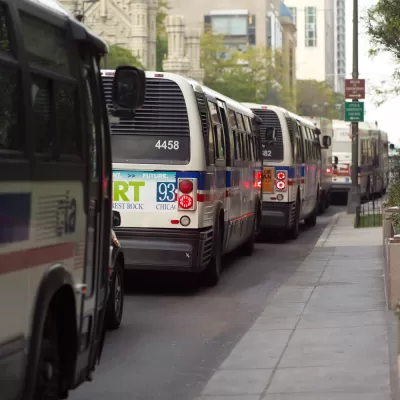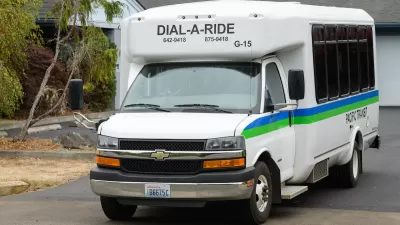Lawmakers and experts expressed varying levels of support for increased funding for transit systems.

In a hearing of the House Committee on Transportation and Infrastructure subcommittee on highways and transit, federal lawmakers and industry experts weighed in on the state of public transit in the United States.
Dan Zukowski describes the meeting in Smart Cities Dive, writing, “Experts from the transit industry and labor unions called for more federal funding for operations. Others recommended ways that transit agencies could adapt to changes in ridership such as schedules that provide more off-peak and weekend service.”
While some attendees called public transit an “essential service” requiring more funding and resources, one analyst called it a “niche” mode of transportation (while acknowledging that many transit riders have no other option). “[M.J. Maynard, CEO of the Regional Transportation Commission of Southern Nevada] said that public transit agencies have adapted to post-pandemic changes in commuting patterns due to hybrid and remote work arrangements by addressing specific community needs, such as riders who commute during off-peak hours, those with mobility disabilities and those in areas underserved by transit.”
Trending changes in transit operations include the addition of on-demand microtransit, which can help fill transit gaps in rural and less dense communities, but which some transit advocates say could drain resources from fixed-route options. Greg Regan, president of the AFL-CIO’s Transportation Trades Department. said “even the worst-performing bus routes are more cost-effective than microtransit,” and lawmakers should make “a renewed commitment to providing stable, flexible, and sufficient funding for transit operations.”
FULL STORY: Public transit in the post-pandemic world: Views diverge at congressional hearing

Alabama: Trump Terminates Settlements for Black Communities Harmed By Raw Sewage
Trump deemed the landmark civil rights agreement “illegal DEI and environmental justice policy.”

Planetizen Federal Action Tracker
A weekly monitor of how Trump’s orders and actions are impacting planners and planning in America.

The 120 Year Old Tiny Home Villages That Sheltered San Francisco’s Earthquake Refugees
More than a century ago, San Francisco mobilized to house thousands of residents displaced by the 1906 earthquake. Could their strategy offer a model for the present?

In Both Crashes and Crime, Public Transportation is Far Safer than Driving
Contrary to popular assumptions, public transportation has far lower crash and crime rates than automobile travel. For safer communities, improve and encourage transit travel.

Report: Zoning Reforms Should Complement Nashville’s Ambitious Transit Plan
Without reform, restrictive zoning codes will limit the impact of the city’s planned transit expansion and could exclude some of the residents who depend on transit the most.

Judge Orders Release of Frozen IRA, IIJA Funding
The decision is a victory for environmental groups who charged that freezing funds for critical infrastructure and disaster response programs caused “real and irreparable harm” to communities.
Urban Design for Planners 1: Software Tools
This six-course series explores essential urban design concepts using open source software and equips planners with the tools they need to participate fully in the urban design process.
Planning for Universal Design
Learn the tools for implementing Universal Design in planning regulations.
Clanton & Associates, Inc.
Jessamine County Fiscal Court
Institute for Housing and Urban Development Studies (IHS)
City of Grandview
Harvard GSD Executive Education
Toledo-Lucas County Plan Commissions
Salt Lake City
NYU Wagner Graduate School of Public Service





























